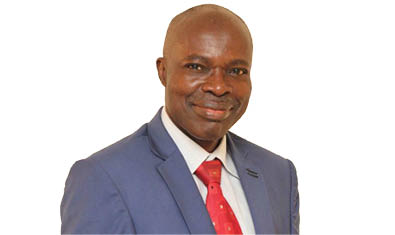Amid pressing challenges in Nigeria’s education sector, the Vice Chancellor of Precious Cornerstone University (PCU), Professor Timothy Adejumo, speaks with Funmi Ojo on the prospects of the student loan programme, the impact of TETFund, and the recent directive from the Minister of Education on the admission of underage students, among other crucial issues.
There had been concerns over the level of funding for tertiary institutions by the federal government. What’s your take on this?
As you are aware, this is a new government with the emergence of President Bola Ahmed Tinubu who has presented to Nigerians the ‘Renewed Hope Agenda’. I want to believe that he is doing more than his predecessors because in January this year, we learnt that he approved N683 billion to support the education sector. And recently, we heard that he has inaugurated the committee that is working on student loans. However, that is for the federal universities. They are trying a pilot scheme of the programme (loan) with federal universities. So we are still expecting what he is going to do for private institutions. Essentially, he is trying, however it is not up to the recommended level by UNESCO (United Nations Educational, Scientific and Cultural Organization). They recommended that 26 percent of the national budget of a country should be voted to education and this is because education is very important to citizens’ development as well as building human capacity.
The Federal Government has commenced the process for the implementation of the student loan. What is your observation on this?
Yes, it’s a good step in the right direction. But the Federal Government should make sure that these things don’t go into the hands of politicians because we know what they normally do. They make a mess of the whole thing. So it’s a good development. And the area that I was not satisfied with was that when students graduate, they will begin to pay back the loan. What of those who are unable to secure a job? I hope that the first procedure for assessing this loan has been modified.
The Academic Staff Union of Universities, (ASUU), said the loan is part of the plan by the federal government to enrich a few individuals who own private universities in the country. Do you agree with that?
No, it’s not correct that the student loan is for private purses in private institutions. It’s not correct. To the extent that I know, our institution is faith-based. We make sure that our students have spiritual soundness in addition to academic excellence. So everything that we do here is to the glory of God. We make sure that we don’t do irrational things that are going on elsewhere. And as you know, private universities are better than conventional universities because we specially train them to be employers of labour. Immediately, they graduate at the 300 level, we ensure that they register a business with the Corporate Affairs Commission. We believe that by the time they graduate, they would have set up something that will contribute to the economy and that will make them entrepreneurs.
Due to the level of corruption among political office holders, what do you think should be done to guide against corruption in student loans?
The government has to make sure that it is well monitored. A task or project that is not adequately monitored would not be done as you conceived it. If it is well coordinated, make sure that those appointed as Managing Directors or Executive Directors are God-fearing. Besides that, their activities have to be monitored from time to time. So monitoring and quality assurance are the keys.
Some have clamoured for private institutions to benefit from the Tertiary Education Trust Fund. What is your position on it?
I feel that the Federal Government should reconsider its stance on whether private institutions should benefit from the TETFund. Because the private university is helping the government in the area of human capacity development. Also, parents of students in private institutions pay tax. What is good for the goose is good for the gander. The Federal Government should understand that private universities are helping them do their jobs. Because of the establishment of private institutions, we have 274 universities in the country. There 63 state universities, 62 federal universities, and 149 private institutions in the country. These institutions are helping the Federal Government to absorb the students. Moreover, we have been told that in 2050, the population of the country will skyrocket. So, we have to make sure that there are adequate provisions for the universities that will take care of the students. Recently we were told that about 50% of those who sat for JAMB were not admitted into universities.
Former Chairman of the Committee of Pro-Chancellors of State-Owned Universities, Yusuf Ali, recently said private universities should not benefit from TETFund because they are established to earn into the private purse and not government coffers. What is your take on it?
It is not true. The fear of the Federal Government is that if the private universities benefit from TETFund, the money will just go into private pockets. It is not true. Before I joined this institution (PCU) as the vice chancellor, I used to have the wrong impression about private institutions. And it is high time people really got to know the real situation of things. It is generally believed that the parents of students in private institutions are rich. It is not true. Up to now, about three-quarters of our students have not paid. You know, we put up our payment of school fees at 50%, 70%, then 90%, and then 100%. Presently, we are in the second semester, and some of our students are at home because we don’t encourage them to come to school if they have not paid certain parts of the school fees. School fees are the major source of income for private institutions, which come from either proprietor or non-proprietor sources.
The number of Nigerians leaving the country has continued to increase, thereby causing a brain drain in the education sector and others. What do you think should be done to tackle this menace?
As long as the government refuses to do what is necessary, there will be JAPA syndrome. Look at the level of insecurity and inflation. In the last few weeks, it has been very difficult to get Fuel (Premium Motor Spirit). The truth is that it is difficult for the youth to see all these things and be willing to be in the country. In the past, I used to tell people that almost every youth has a plan B. They are processing something. Some of them are still around probably becuase their travel document is not yet perfected. We lose people, even including our lecturers here. Human beings are dynamic. People will always go for greener pastures where situations are better. So it is left for our leaders to make sure that our country is improved.
The Minister of Education, Prof. Tahir Mamman, recently said that underage students are causing progress in universities. How is that possible?
Well, I read in the report that he is actually proposing that the age for admission to university should be 18 to tally with the 6-3-3-4 education. If you add 6-3-3-4, you will see that this is 18 years old, but it has not been approved by the lawmakers. Presently, you know, it is assumed that underage students admitted to universities are not mature and can be easily influenced. But for younger students that are so brilliant, even more brilliant than those that are 18; they should make them fly. They should allow them to proceed with their education.
The minister warned that parents should stop registering underage children for JAMB. Is it not the responsibility of the institution not to admit underage children?
Well, for now, I don’t think there is any regulation that universities should not admit students below 18 years of age, and because I just talked to the admission officers and I was reliably informed that they have not obtained any regulation that potential students below the age of 18 should not be admitted.
What is the minimum age that can be admitted into your university?
I think it’s from 16 years old and above that is the required age everywhere, but if the Federal Government mandates every institution not to admit any student below 18, so be it.
How is your institution handling student’s misbehaviors?
The private university is where you can get a real education. Here, we train students to be Godly and to be God-fearing. Our institution is unique. We take God as the head in everything. We imbibe in them the culture of truth and honesty. We do not tolerate cultism or irrational behaviour. Here, there is no cultism, no taking of illicit drugs, and no irrational behaviour. We thank God that for the few who are going outside the rules and regulations of the university, we are able to discipline them appropriately. So private universities are better than public institutions run by the federal and state governments.
What are the new accademic programmes that your institution is planning to introduce?
As part of ensuring the best in our academic activities, we will be commencing new postgraduate programmes soon. Postgraduate studies in microbiology, biochemistry, computer science, accounting, and business administration. And for undergraduate studies, God willing, by the next academic session we want to start two faculties; Faculty of Arts, in which we have Christian Religious Studies, Creative and Performing Arts, and Music. While for the Faculty of Allied Health Sciences, we want to have medical lab science, we want to have nursing, we want to have public health, and we want to have human nutrition and dietetics. So these are the four major courses that we want to have, and by the grace of God, the location will be at KASUMU. PCU is noted for having zero tolerance for cultism, promiscuity, vandalism, and all forms of immorality in society. One thing that sets private universities apart is their stable academic calendar. No interruption. The day you receive your admission letter to the university, you can project that after four years, if it is a four-year course, you will graduate. There’s no strike, no disruption of the academic calendar at all. For us, we have flexibility in the payment of our school fees. As I told you earlier, 50 percent, 70 percent, 90 percent, and 100 percent are in four installments, and that’s why students and parents prefer us.
 National Telescope national telescope newspaper
National Telescope national telescope newspaper





